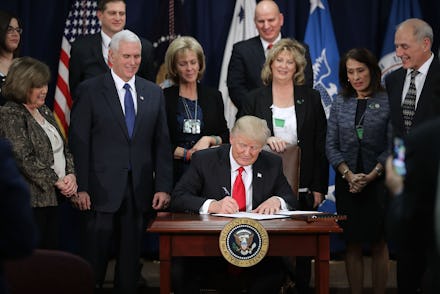Donald Trump just declared war on sanctuary cities — but there’s one huge snag

President Donald Trump appeared on Wednesday at the Department of Homeland Security to tout executive orders aimed at defunding sanctuary cities. "I want you to know your children will not have lost their lives for no reason," Trump said, after naming several Americans killed by undocumented immigrants in the United States.
The order Trump signed on Wednesday will "figure out how we can defund those streams" of revenue that flow from the federal government to more than 400 communities that fall into this category, Sean Spicer, Trump's press secretary, said.
But Trump's order may be remembered as little more than a messaging tactic. The authority to allocate and withdraw federal funds lies with Congress, meaning Trump's order may not be legally sufficient to cut federal funds to these cities. Further, policies regarding sanctuary cities are more complex than Trump's order seems to assume.
In describing Trump's action, Spicer said the president will "strip federal grant money from sanctuary states and cities that harbor illegal immigrants."
The use of the word "harbor" is particularly misleading, Christopher Lasch, a professor at the University of Denver who has closely followed legal decisions that support sanctuary cities, said.
"Harboring is a precise legal term," Lasch said. "That conjures up images of these cities violating federal law and protecting immigrants."
In many cities, the reality is quite the opposite. The term "sanctuary city" has no definitive legal meaning, but it generally refers to jurisdictions that do not detain undocumented immigrants solely because they are undocumented. The requests to detain those immigrants come from Immigration and Customs Enforcement, a federal agency.
Without a judicial warrant or probable cause of criminal activity, local law enforcement generally cannot detain individuals or prolong the detention of individuals otherwise entitled to release. Legal decisions have argued it is illegal for cities to hold people simply because they are in the country without documentation — even if the federal government is requesting the detainer.
In fact, such federal calls for detainment formally ended in 2014. Because of mounting legal evidence that asking cities to hold people without a warrant was unconstitutional, the Department of Homeland Security ended its Secure Communities program by changing "requests for detention" to "requests for notification" that an undocumented immigrant was being released. Cities do not have to honor the notification provision.
Trump is essentially asking cities to violate the U.S. Constitution or lose federal grants, Lasch said. And though they call themselves sanctuaries, federal officials still can enter any of these localities and arrest people for being in the U.S. without documentation, Lasch added.
If Trump moves ahead with cutting federal grants, federal dollars could stop flowing to some of America's largest cities. Los Angeles, Boston, Philadelphia and other cities stand to lose billions of dollars.
Lasch maintains Trump's order is more about appearing to keep a campaign promise than changing policy because the president not have the authority to cut this funding. "There’s some real rhetorical power to this," Lasch said. "This is less about accomplishing anything than about making a very public splash."